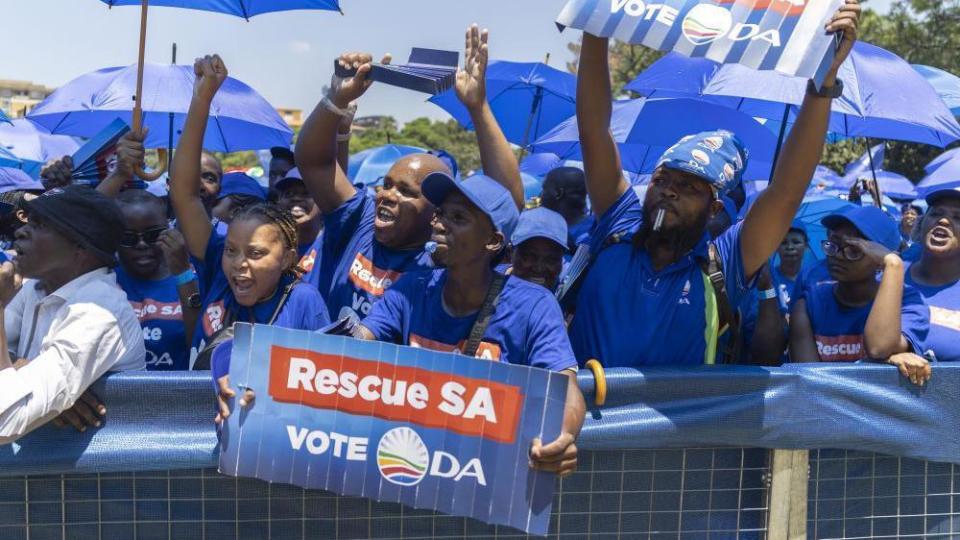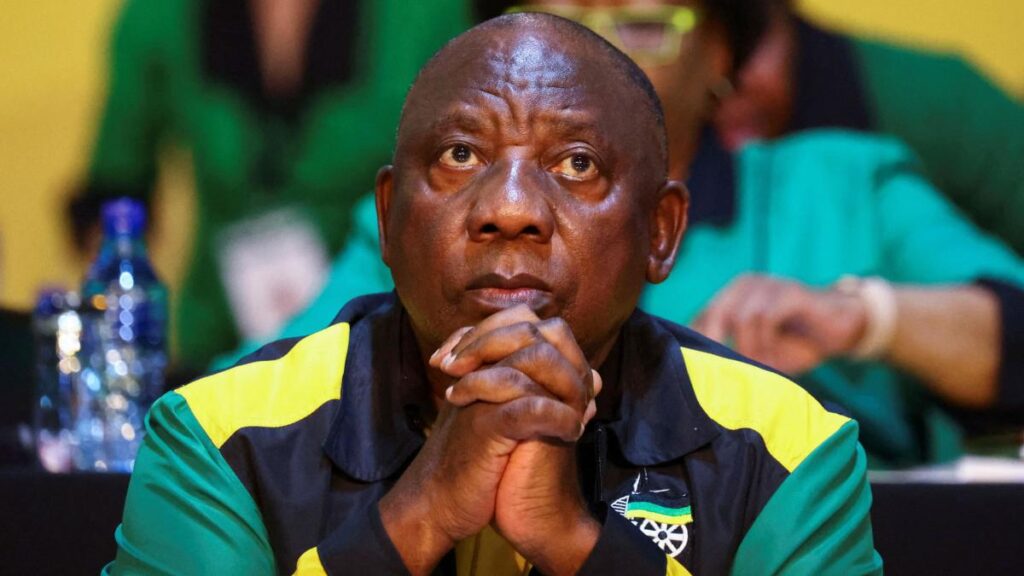With most of South Africa’s election results now known, the long-ruling African National Congress (ANC) will face power-sharing after a historic loss of its parliamentary majority.
The counting of more than 80% of voting districts has been completed and the ANC’s share of the vote currently stands at 41%.
Trailing behind are the Democratic Alliance (DA) with 22%, the MK party led by former president Jacob Zuma with 13% and the EFF with 9%.
Final results are expected this weekend.
The ANC has always been above 50% since the first democratic elections in 1994, in which Nelson Mandela became president.
Support for the ANC has declined significantly due to anger over high levels of corruption, unemployment and crime.
A woman who has voted for the ANC in every election for 30 years switched to the DA this time, saying she wanted them out of power completely because of the cost of living crisis and frequent power cuts.
“This result is not good. I wanted it out of government. We have to give someone else a chance,” she told the BBC.
Now the ANC is trying to hold on to power by forming a coalition with one or more parties.
ANC president Gwede Mantashe said his party is unlikely to form an alliance with the centre-right DA, which is currently in second place with 22%.
He said there should be “policy coordination” between the parties to a coalition agreement.
For the ANC, its black empowerment policy – aimed at giving black people a share in the economy after their exclusion during the racist apartheid era – was ‘non-negotiable’.


He added that any coalition partner would have to agree to the National Health Insurance (NHI) Bill, which was signed into law earlier this month.
The DA opposes both the NHI and ANC policies for black empowerment.
The DA’s support appears to have increased in these elections, with the party regaining the votes of white people who had supported a party on the right in the last election, and some black people who felt the party should be given a chance in the national government. .
Despite the ANC’s reluctance to join the DA, leader John Steenhuisen has not ruled out the idea.
Mr Steenhuisen said if an alliance with the ANC were reached there would be a number of non-negotiables.
‘Respect for the rule of law and the constitution, a social market economy that treats the private sector as partners in the growth agenda.
“Zero tolerance for corruption and executive staffing, and an absolute laser-like focus on economic policies that grow jobs.”
Mr Steenhuisen also told the BBC that he would need to consult coalition partners before the election before considering negotiations.
But he ruled out the EFF and the MK party, both of which advocate seizing white-owned land and nationalizing mines, as potential coalition partners.
“I think instability is not in the best interest of the country. A coalition with the radical left in South Africa of the MK party and the EFF will produce the same policies that destroyed Zimbabwe, and destroyed Venezuela,” he said.
One possibility would be a coalition between the former MK party and the ANC, both in KwaZulu-Natal and nationally – but given the volatile relations between the two parties, that seems unlikely.
Although Mr Zuma has been suspended from the ANC, he is still a member. He appeared to suggest he would strike a deal with the ANC if it replaced President Cyril Ramaphosa as leader.
“My problem is with the leadership of the ANC, not with the ANC itself or its membership,” he said.
However, he was reluctant to discuss the prospect of striking a post-election pact with the ANC.
Another option would be to work with the EFF, led by Julius Malema, a former ANC youth leader. The two parties currently form the coalition that governs the country’s largest city, Johannesburg.
There were a record 70 parties and 11 independents, while South Africans voted for a new parliament and nine provincial parliaments.
The DA has signed a pact with ten of them, agreeing to form a coalition government if they get enough votes to oust the ANC from power.
But this does not apply to the EFF or the MK, which would be needed to form a majority.
As the parties scramble to form alliances, Kenya’s former president Uhuru Kenyatta, who heads the African Union’s election observation mission in South Africa, offered advice on building coalitions.
He said coalition governments should focus on areas of agreement rather than differences.
“I can only wish them the best and hope that the leadership will take this decision of the people in a positive framework,” he said.




Go to BBCAfrica.com for more news from the African continent.
follow us on twitter @BBCAfricaon Facebook at BBC Africa or on Instagram at BBCAfrica
BBC Africa Podcasts







